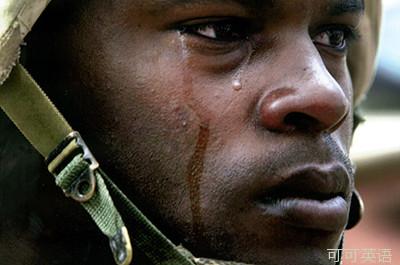War is hell. And for many soldiers, the experience leaves lasting scars. And not just physical ones. A subset of veterans develop post-traumatic stress disorder, or PTSD. But it might not be only the horrors of battle that make them susceptible. According to a study in the journal Psychological Science echoes of childhood abuse may contribute.
戰爭就是地獄。對于許多軍人來說,戰爭的經歷給他們留下了永遠的創傷,并不僅僅是指身體上的創傷。根據一項發表在《心理科學雜志》上的題為“虐待兒童可能造成的影響”的研究,一小部分退伍軍人患上了創傷后應激障礙,略作 PTSD,然而對戰爭的恐懼并不足以使他們患上這種心理疾病。

Psychologists assessed the mental health of hundreds of Danish soldiers before, during and eight months after they were shipped to Afghanistan. Turns out the vast majority, some 84 percent, were resilient, showing no undue signs of stress at any time. A small number, about 4 percent, developed PTSD, with symptoms that showed up when the troops returned home.
心理學家們評估了上百名丹麥士兵被派往阿富汗戰場之前,期間以及八個月之后的心理健康水平。結果證明,大多數(大約84%)士兵的精神適應力強,在任何時候都沒有跡象顯示他們承受著過度的壓力。在部隊撤回后,一小部分士兵(大約4%)出現了創傷后應激障礙的癥狀。
When the researchers compared those two groups, they discovered that the cohort with PTSD had not been exposed to more battlefield trauma—but they were more likely to have experienced violence or abuse in civilian life, particularly as a child.
當研究人員比較這兩組士兵時,發現患上創傷后應激障礙的戰士并沒有更多地接觸到戰地創傷,但是他們在平常生活中經歷過暴力或者虐待的可能性更大,尤其是在兒童時期。
For the remaining soldiers, being deployed actually helped: something about being part of the team quelled the anxiety they started out with. That finding suggests that PTSD is not uniform, even for those in uniform. And that one man's poison may be another man's cure.
對于從戰場上幸存的戰士來說,聽從指揮實際上有所幫助:這種成為團隊一員的歸屬感平息了一開始就有的焦慮心態。這個發現證明:即使對那些身穿制服的士兵,創傷后應激障礙也并不完全一樣。這就所謂的我之毒藥,彼之良藥。












